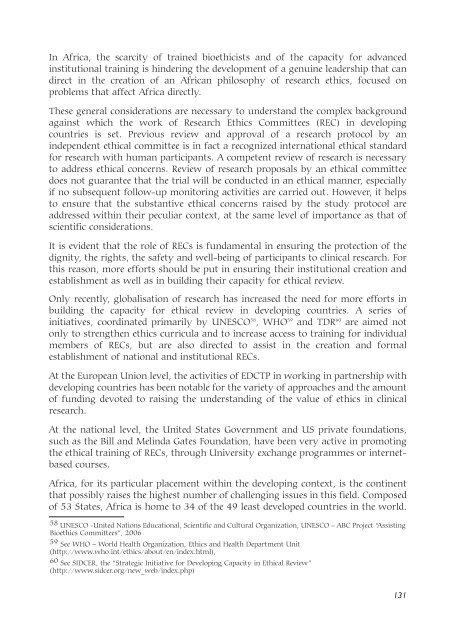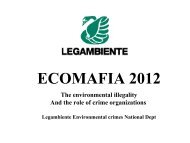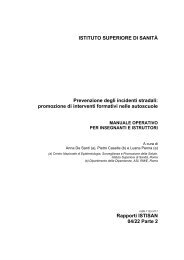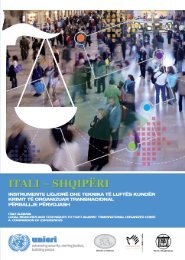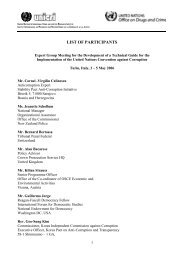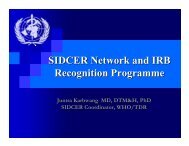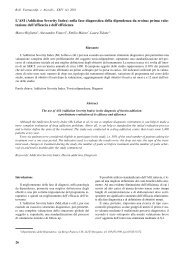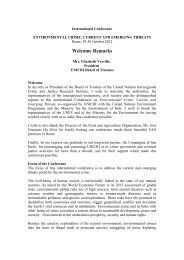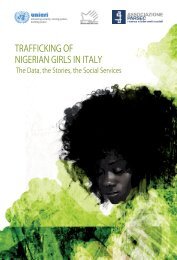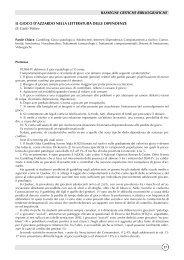Biomedical Research in Developing Countries - UNICRI
Biomedical Research in Developing Countries - UNICRI
Biomedical Research in Developing Countries - UNICRI
Create successful ePaper yourself
Turn your PDF publications into a flip-book with our unique Google optimized e-Paper software.
In Africa, the scarcity of tra<strong>in</strong>ed bioethicists and of the capacity for advanced<br />
<strong>in</strong>stitutional tra<strong>in</strong><strong>in</strong>g is h<strong>in</strong>der<strong>in</strong>g the development of a genu<strong>in</strong>e leadership that can<br />
direct <strong>in</strong> the creation of an African philosophy of research ethics, focused on<br />
problems that affect Africa directly.<br />
These general considerations are necessary to understand the complex background<br />
aga<strong>in</strong>st which the work of <strong>Research</strong> Ethics Committees (REC) <strong>in</strong> develop<strong>in</strong>g<br />
countries is set. Previous review and approval of a research protocol by an<br />
<strong>in</strong>dependent ethical committee is <strong>in</strong> fact a recognized <strong>in</strong>ternational ethical standard<br />
for research with human participants. A competent review of research is necessary<br />
to address ethical concerns. Review of research proposals by an ethical committee<br />
does not guarantee that the trial will be conducted <strong>in</strong> an ethical manner, especially<br />
if no subsequent follow-up monitor<strong>in</strong>g activities are carried out. However, it helps<br />
to ensure that the substantive ethical concerns raised by the study protocol are<br />
addressed with<strong>in</strong> their peculiar context, at the same level of importance as that of<br />
scientific considerations.<br />
It is evident that the role of RECs is fundamental <strong>in</strong> ensur<strong>in</strong>g the protection of the<br />
dignity, the rights, the safety and well-be<strong>in</strong>g of participants to cl<strong>in</strong>ical research. For<br />
this reason, more efforts should be put <strong>in</strong> ensur<strong>in</strong>g their <strong>in</strong>stitutional creation and<br />
establishment as well as <strong>in</strong> build<strong>in</strong>g their capacity for ethical review.<br />
Only recently, globalisation of research has <strong>in</strong>creased the need for more efforts <strong>in</strong><br />
build<strong>in</strong>g the capacity for ethical review <strong>in</strong> develop<strong>in</strong>g countries. A series of<br />
<strong>in</strong>itiatives, coord<strong>in</strong>ated primarily by UNESCO 58 , WHO 59 and TDR 60 are aimed not<br />
only to strengthen ethics curricula and to <strong>in</strong>crease access to tra<strong>in</strong><strong>in</strong>g for <strong>in</strong>dividual<br />
members of RECs, but are also directed to assist <strong>in</strong> the creation and formal<br />
establishment of national and <strong>in</strong>stitutional RECs.<br />
At the European Union level, the activities of EDCTP <strong>in</strong> work<strong>in</strong>g <strong>in</strong> partnership with<br />
develop<strong>in</strong>g countries has been notable for the variety of approaches and the amount<br />
of fund<strong>in</strong>g devoted to rais<strong>in</strong>g the understand<strong>in</strong>g of the value of ethics <strong>in</strong> cl<strong>in</strong>ical<br />
research.<br />
At the national level, the United States Government and US private foundations,<br />
such as the Bill and Mel<strong>in</strong>da Gates Foundation, have been very active <strong>in</strong> promot<strong>in</strong>g<br />
the ethical tra<strong>in</strong><strong>in</strong>g of RECs, through University exchange programmes or <strong>in</strong>ternetbased<br />
courses.<br />
Africa, for its particular placement with<strong>in</strong> the develop<strong>in</strong>g context, is the cont<strong>in</strong>ent<br />
that possibly raises the highest number of challeng<strong>in</strong>g issues <strong>in</strong> this field. Composed<br />
of 53 States, Africa is home to 34 of the 49 least developed countries <strong>in</strong> the world.<br />
58 UNESCO -United Nations Educational, Scientific and Cultural Organization, UNESCO – ABC Project “Assist<strong>in</strong>g<br />
Bioethics Committees”, 2006<br />
59 See WHO – World Health Organization, Ethics and Health Department Unit<br />
(http://www.who.<strong>in</strong>t/ethics/about/en/<strong>in</strong>dex.html),<br />
60 See SIDCER, the “Strategic Initiative for Develop<strong>in</strong>g Capacity <strong>in</strong> Ethical Review”<br />
(http://www.sidcer.org/new_web/<strong>in</strong>dex.php)<br />
131


